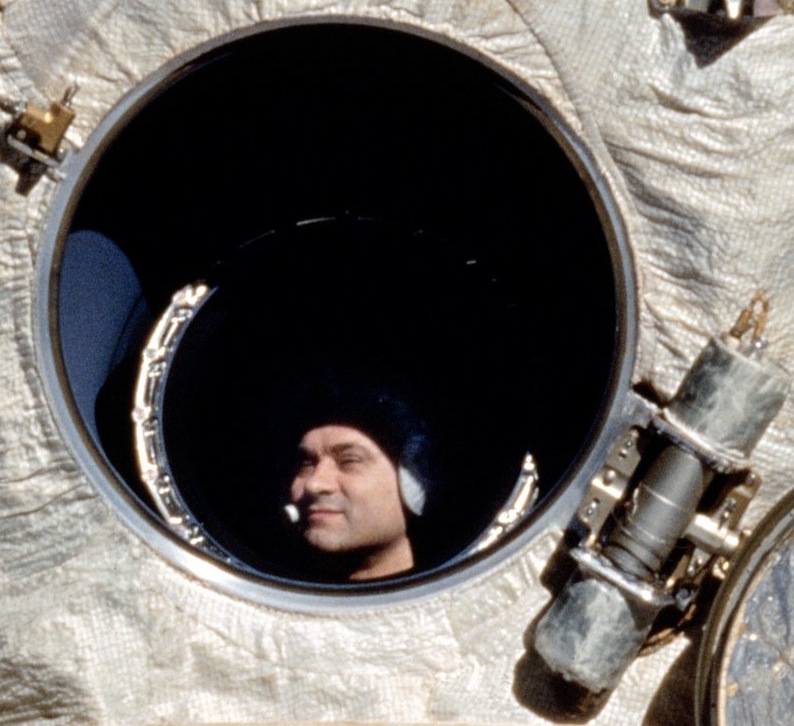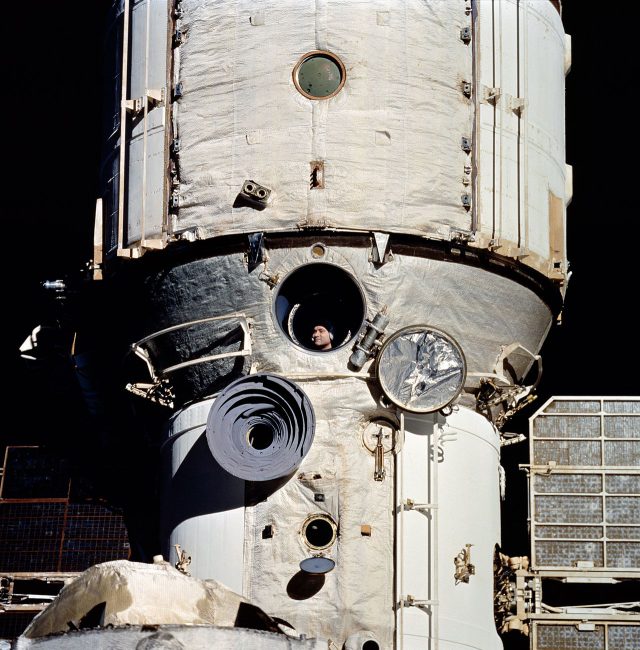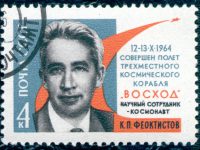
Cosmonaut Valeriy V. Polyakov
On March 22, 1995, Russian cosmonaut Valeri Polyakov returned to earth after a 437 days space flight, setting a record for the longest single spaceflight in human history so far, staying aboard the Mir space station.[4] Polyakov did not suffer from any prolonged performance impairments after returning to Earth. In light of these findings, researchers concluded that a stable mood and overall function could be maintained during extended duration spaceflights, such as manned missions to Mars.
Valeri Polyakov – Youth and Education
Polyakov was born in Tula in the USSR on 27 April 1942. Born Valeri Ivanovich Korshunov, Polyakov legally changed his name after being adopted by his stepfather in 1957. He was educated at the Tula Secondary School No. 4, from which he graduated in 1959. He enrolled in the I. M. Sechenov 1st Moscow Medical Institute, where he graduated with a doctoral degree. Afterwards, Polyakov enrolled in the Institute of Medical and Biological Problems, Ministry of Public Health, Moscow, where he specialized in astronautics medicine. At the Institute of Medical and Biological Problems, Polyakov began to dedicate his research to the field of space medicine in 1964 after the flight of the first physician in space, Boris Yegorov, aboard Voskhod 1.
First Mission as a Cosmonaut
In 1972, he was selected a cosmonaut in Medical Group 3 and in 1988, his first flight into space took place on Soyuz TM-6 to Mir space station as the first cosmonaut-researcher of TPK Soyuz TM-6 together with V. A. Lyakhov and A. Ahad Momand under the EP-Z program, and also as part of EO-Z together with B. G. Titov and M. X. Manarov and EO-4 together with A. A. Volkov, S. K. Krikalev and J.-L. Chretien. Overall, Polyakov’s first space mission lasted from August 29, 1988 to April 27, 1989, i.e. 240 days, 23 hours 35 minutes and 49 seconds.
The Longest Single Human Space Flight in History
His second spaceflight was also the longest human spaceflight in history, began on January 8, 1994 with the launch of the Soyuz TM-18 mission. Polyakov spent 437 days, 17 hours, 58 minutes and four seconds aboard Mir conducting experiments and performing scientific research. The cosmonaut completed more than 7,000 orbits of the Earth and formally broke the spaceflight duration record after 366 days. The record was previously set by Vladimir Titov and Musa Manarov six years earlier. On March 22, 1995 Valeri Polyakov returned to Earth aboard Soyuz TM-20. Right after landing, Polyakov demanded not to be carried the few feet between the Soyuz capsule and a nearby lawn chair. Instead, the cosmonaut walked the distance, hoping to prove that humans could be physically capable of working on the surface of Mars after a long-duration transit phase.

Polyakov observes rendezvous operations with the Space Shuttle Discovery on its STS-63 mission through a window on the Mir Core Module in February 1995.
…and its Effects on the Human Body
Polyakov volunteered for his 437-day flight to learn how the human body would respond to the micro-gravity environment on long-duration missions to Mars. Polyakov underwent medical assessments before, during, and after the flight. He further underwent two follow-up examinations six months after returning to Earth. When researchers compared the results of these medical exams, it was revealed that although there were no impairments of cognitive functions, Polyakov experienced a clear decline in mood as well as a feeling of increased workload during the first few weeks of spaceflight and return to Earth. However, his mood indeed started to stabilize to pre-flight levels between the second and fourteenth month of his mission. Polyakov also did not suffer from any prolonged performance impairments after returning to Earth.
Aftermath
Polyakov’s record was later broken by Sergei Avdeyev and is currently held by Gennady Padalka, who has spent 879 days in space. In April 1995 Polyakov was awarded the Hero of the Russian Federation by decree of the then Russian President Boris Yeltsin. On 1 June 1995 he left the cosmonaut programme. He participated in experiment SFINCSS-99 (Simulation of Flight of International Crew on Space Station) in 1999. Polyakov is currently the Deputy Director of the Ministry of Public Health in Moscow, where he oversees the medical aspects of long-duration space missions. It is widely believed that this record held by Valeri Polyakov will remain unchallenged for a long time to come and could be broken only by a Mission to Mars.
Kazakhstan-Down-To-Earth Homecoming For Record Cos, [8]
References and Further Readings:
- [1] Mental performance in extreme environments: results from a performance monitoring study during a 438-day spaceflight
- [2] Short Biography on Spacefacts
- [3] March 22, 1995: Longest Human Space Adventure Ends at Wired
- [4] The first Modular Space Station – Mir, SciHi Blog
- [5] “Polyakov”. Encyclopedia Astronautica.
- [6] “March 22nd, 1995 – 15th Anniversary of Valeri Polyakov’s return to Earth”. Space Yuga.
- [7] Valeri Polyakov at Wikidata
- [8] Kazakhstan-Down-To-Earth Homecoming For Record Cos, (3 Apr 1995) T/I 10:04:49, AP Archive @ youtube
- [9] Madrigal, Alexis (22 March 2010). “March 22, 1995: Longest Human Space Adventure Ends”. Wired.com
- [10] The Top 100 astronauts with the longest time in space, via Wikidata, picture size equivalent time in space




